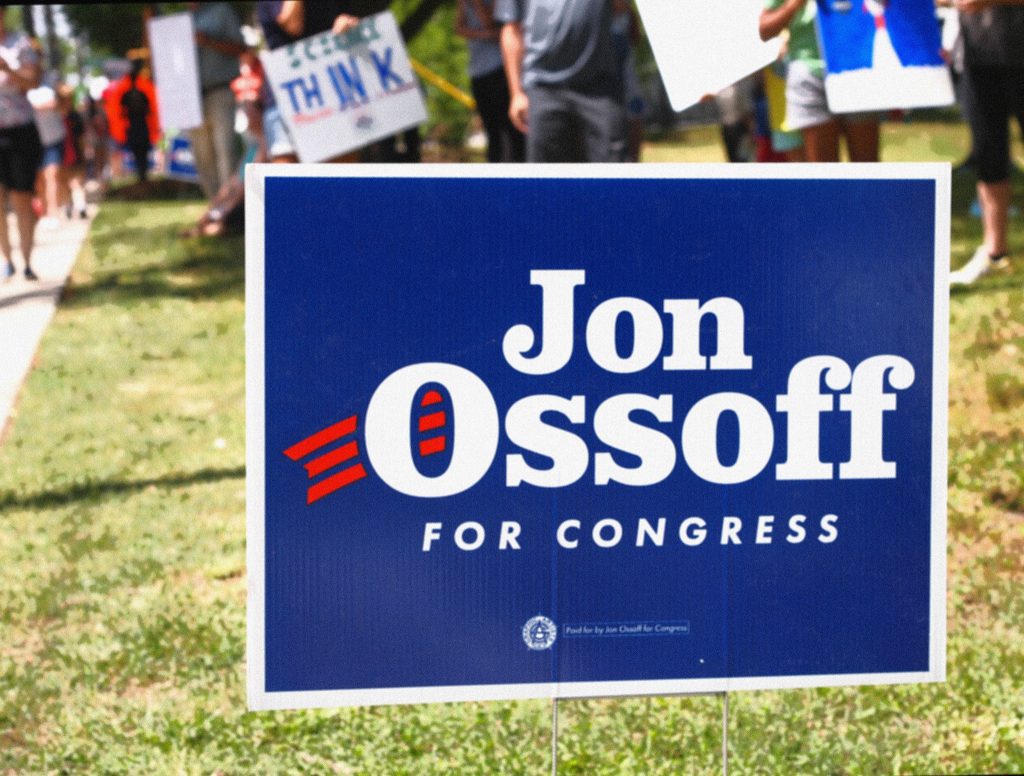This Tuesday, Georgia held a special election to fill Tom Price’s congressional seat in the 6th district. Price vacated the seat earlier this year to become President Trump’s Secretary of Health and Human Services. The area has strong Republican roots, having sent GOP members to Congress for the past 40 years. In the past five presidential elections, the county has voted red, and until 2016, that victory margin remained in the double-digit range.
However, Trump only defeated Hillary Clinton in the district by one percent, and his approval ratings average 40 percent, which is supremely low for any president, let alone one who has not even been in office for six months. These two factors had some Democrats hoping to flip the district. They rested their hopes on Jon Ossoff, a thirty-year-old man who has yet to hold public office, instead boasting his positions as a journalist, congressional aide, and part-owner of a documentary film company. In the initial special election, Ossoff won a plurality of the vote, with 48 percent. However, a majority was needed. As such, a runoff election was scheduled between Ossoff and Karen Handel, a Republican, who had the next highest vote percentage at 20 percent.
The election gained national attention, not only because it was viewed as a referendum on Trump’s first months as president, but also because it turned out to be the most expensive House election in U.S. history. In the end, Handel won by a little under 10,000 votes.
The results of the special election in the Georgia 6th may have some Democrats scratching their heads. How could a candidate from the same party as the widely detested Trump, one whom he even endorsed, win this election? The answer seems fairly simple.
Democrats need to move to the left.
This is not the first time since November that people have called for such an action. Bernie Sanders attempted to make such a hope a reality, both before and after his failed primary campaign to be the Democratic presidential nominee. Keith Ellison, who came in second for the DNC chairmanship out of a pool of seven, wanted the party to move left. Most recently, American politicos have cited the British election, in which Labour won its highest vote percentage in 20 years, as an example of a growing thirst for socialism.
Yet, the Democratic Party is not listening. Ossoff’s platform is more of the same neo-liberalism that has ruled the party since Bill Clinton. His campaign platform throws around phrases like “balanced budget” and offers vague promises to serve veterans and elderly people with diligence. He does not mention leftist policy tenants such as a single-payer healthcare system, a path to citizenship for immigrants who arrived illegally, or campaign finance reform. Ossoff is not a Democrat so much as he is a moderate who leans left.
Granted, Ossoff worked on the assumption that a movement to the center was needed to win such a historically Republican district. He saw a chance to gain the support of the three-quarters of Republicans who are fiscally conservative and unhappy with a party that continues to become more socially conservative. However, this swing towards moderatism backfired, convincing voters that “he didn’t stand for anything.”
There is evidence aplenty that Americans are in favor of a de facto leftist government. Two-thirds of Americans reject the idea that the government should only perform basic functions. Nearly three-quarters s of Americans support having the option of euthanasia. Half of the public believes the United States needs more civil rights laws to protect people who identify as LGBTQ+. Sixty-four percent support state recognition of gay marriage. More than half believe it is the state’s responsibility to provide healthcare. Even as the public image of the Democratic Party falters, its core beliefs gain popularity.
The issue is that Democrats play by the old rules, meant for a country where money does not rule elections and districts aren’t pre-drawn to favor one party over another. The issue is that Democrats agree to play nice, both together and against Republicans. The issue is that “populism” has become a bad word, an innuendo for surges in rightist movements, and Democrats cannot seem to reclaim the word for egalitarianism and working-class activism for themselves.
The time for playing safe is over. Democrats need to learn the importance of a bold, clear message. More importantly, they need to have one. Democrats must champion the working class by fighting monopolies such as the much-lauded Amazon-Whole Foods merger, implementing a single-payer healthcare option, and calling for increased interest rates so that more than eight percent of Americans can be considered to be in good financial health. In short, Democrats need to step up their game. Immediately. Otherwise, Republicans will retain control of the government for a very long time.
Image Credit: Flickr / Thomas Cizauskas Copyright 2.0
